

What is difference between desire and want. Possesive_Pronouns_Adjectives. Diferencias entre "I wish, if only, I hope" para expresar deseo, quejas o arrepentimiento. "Wish" para expresar deseos presentes, futuros y pasados Para expresar un deseo futuro, o presente, en español decimos: Por ejemplo: Ojalá pudieras venir a mi fiesta.
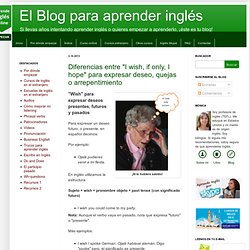
En inglés utilizamos la estructura: Sujeto + wish + pronombre objeto + past tense (con significado futuro) I wish you could come to my party. Más ejemplos: I wish I spoke German. Para expresar deseos del pasado (situaciones que ya no se pueden cambiar) decimos: Ojalá hubieras podido venir. Sujeto + wish + pronombre objeto + past perfect. I wish you had been able to come.En este post, que incluye un vídeo, explico con más detalle el uso de "wish" para expresar deseo. If only Ahora bien ¿Cuál es la diferencia entre I wish/ If only/ I hope?
"If only" significa lo mismo que "I wish", pero es más enfático. Además, "if only" puede aparecer como una frase independiente sin nada más añadido. Así, por ejemplo, "If only!.... " "I wish" , en cambio, requiere que completemos la frase. Para deseos presentes la estructura de "If only" es la siguiente: Wish+simple past. If only, I wish. English Grammar Lessons. Let's start off with the easy part. ' I wish to' can mean the same as 'I want to' but it is much, much more formal and much, much less common.
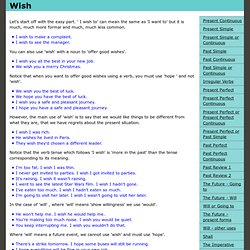
I wish to make a complaint. I wish to see the manager. You can also use 'wish' with a noun to 'offer good wishes'. I wish you all the best in your new job. We wish you a merry Christmas. Notice that when you want to offer good wishes using a verb, you must use 'hope ' and not 'wish'. We wish you the best of luck. However, the main use of 'wish' is to say that we would like things to be different from what they are, that we have regrets about the present situation. English verb Conjugation: modal verbs, irregular verbs, present, future, participle. Will be able / will can (future) English Grammar Online - free exercises, explanations, vocabulary, dictionary and teaching materials.
English Irregular Verbs. Exercises List of Irregular Verbs a b c d e f g h k l m p q r s t u w *
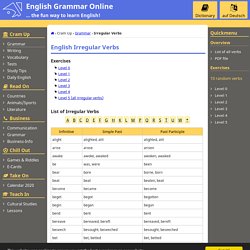
Simple Past. [VERB+ed] or irregular verbs Examples: You called Debbie.
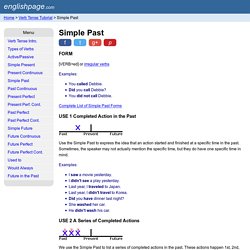
Did you call Debbie? You did not call Debbie. Complete List of Simple Past Forms USE 1 Completed Action in the Past Use the Simple Past to express the idea that an action started and finished at a specific time in the past. I saw a movie yesterday. USE 2 A Series of Completed Actions We use the Simple Past to list a series of completed actions in the past. I finished work, walked to the beach, and found a nice place to swim. USE 3 Duration in Past The Simple Past can be used with a duration which starts and stops in the past. I lived in Brazil for two years. USE 4 Habits in the Past The Simple Past can also be used to describe a habit which stopped in the past.
I studied French when I was a child. Diferencias entre "so that" y "in order to" English conjugation - bab.la verb conjugator. Use the bab.la English verb conjugation and find the conjugation of your preferred English verb quickly and easily.
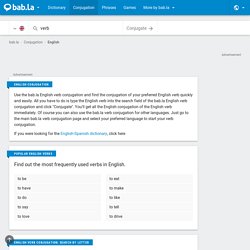
All you have to do is type the English verb into the search field of the bab.la English verb conjugation and click "Conjugate". You'll get all the English conjugation of the English verb immediately. Of course you can also use the bab.la verb conjugation for other languages. Just go to the main bab.la verb conjugation page and select your preferred language to start your verb conjugation. If you were looking for the English-Spanish dictionary, click here English Verb Conjugation: Search by letter If you don't want to use the search function of the bab.la English verb conjugation you can also search English verb conjugation by letter.
Conectores Textuales. Xuletas. Had you got?